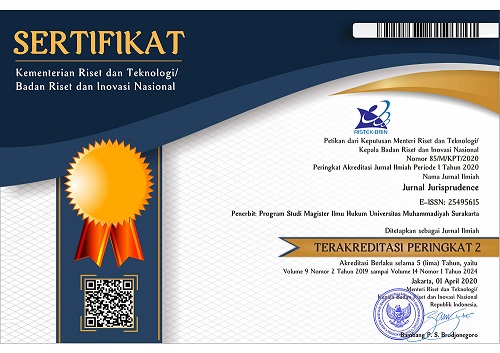Implementation of Governance and Rule of Law on Sustainable Development Realization Viewed by PPLH Law
DOI:
https://doi.org/10.23917/jurisprudence.v14i1.4775Keywords:
Environmental Governance, Rule of Law, PPLH Law, Legal Substance, Law EnforcementAbstract
Purpose of the study:
This article seeks to re-question whether aspects of environmental governance and the rule of law have a relationship with sustainable development. To answer this, this research was conducted by looking at the substance and law enforcement (implementation) of the existing arrangements in the PPLH Law related to aspects of environmental governance and the rule of law and also the desire to realize sustainable development.
Methodology:
This study conducted the Environmental Law using a juridical-normative and normative-empirical approach.
Results:
This article finds that juridically, the norms of environmental governance and the rule of law as well as sustainable development have been well regulated. However, when this is seen in terms of the implementation of the PPLH Law, this study findings show that environmental law enforcement or PPLH Law has not run optimally, and this can result in the objectives of the PPLH Law regarding sustainable development cannot be realized.
Applications of this study:
PPLH Law related to the natural resources mining exploitation permits that potentially increased mistaken environmental governance formulation, increased abuse of power, and violation of environmental law. Indonesia government especially Indonesia’s legislative institution should review PPLH Law to reduce contradicted law between the articles in the PPLH Law.
Novelty/ Originality of this study:
The novelty of the study highlights the critical disconnects that can undermine environmental governance, calling attention to necessary legislative reforms and the strengthening of institutional capacities for effective environmental law enforcement.
Submitted
Accepted
Published
Issue
Section
License
Copyright (c) 2024 Jurnal Jurisprudence

This work is licensed under a Creative Commons Attribution 4.0 International License.

















